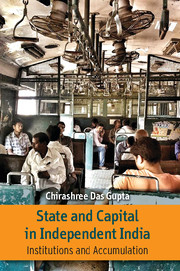Book contents
- Frontmatter
- Dedication
- Contents
- Figures
- Tables
- Acknowledgements
- 1 Introduction
- 2 Globalization and Neoliberalism: The Context and the Debate
- 3 State and Capital in Independent India: The Problematic
- 4 Policy Regimes and Macroeconomic Outcomes: 1947–1966
- 5 Institutionalization of the Regime of Capital in India: 1947–1966
- 6 Continuity and Change in Capital Accumulation: 1966–1980
- 7 Sources of Accumulation: State Intervention and Non-intervention
- 8 ‘Old Oligopolies and New Entrants’ in the Pharmaceutical Sector
- 9 Conclusion
- Bibliography
- Index
8 - ‘Old Oligopolies and New Entrants’ in the Pharmaceutical Sector
Published online by Cambridge University Press: 05 September 2016
- Frontmatter
- Dedication
- Contents
- Figures
- Tables
- Acknowledgements
- 1 Introduction
- 2 Globalization and Neoliberalism: The Context and the Debate
- 3 State and Capital in Independent India: The Problematic
- 4 Policy Regimes and Macroeconomic Outcomes: 1947–1966
- 5 Institutionalization of the Regime of Capital in India: 1947–1966
- 6 Continuity and Change in Capital Accumulation: 1966–1980
- 7 Sources of Accumulation: State Intervention and Non-intervention
- 8 ‘Old Oligopolies and New Entrants’ in the Pharmaceutical Sector
- 9 Conclusion
- Bibliography
- Index
Summary
Our review of the relationship between state and capital since independence has established three features of the Indian economy in its transition since independence. First, the structures of property rights and the labour regime based on cheapening of labour show a resolute continuity across different policy regimes since independence. Second, the agrarian and the fiscal constraint remain not only unaddressed but have intensified across these policy regimes. Third, the different policy regimes have been singularly focussed on the capital constraint and each such regime has seen limited success in creating structures of accumulation that have temporarily eased the capital constraint. However, these have been unsustainable due to the intensification of the agrarian and fiscal constraint.
The fourth constraint at independence had been that of technology. Chapter Four establishes the context in which a laissez-faire approach to the operations of foreign capital in India continued from 1947 to 1965. The capital constraint was one reason for this continuity. However, the technology constraint was even more binding. There were two possible ways in which this could have been overcome. The first was the possibility of the state building in conditions of compulsory innovation on the capitalist class as part of ‘disciplining’ measures. As we have seen throughout the book, the state never had the relative autonomy given the power of the capitalist class at and since independence to even contemplate this as a possibility. The second was the possibility of competitive innovation by the private corporate sector through its own initiative. However, this required not only a willingness to take risk but also to accept the needs of investment with long periods of gestation. The mercantile character of Indian business dictating their political prevailing over property right and tax structures in the perpetuation of labour cheapening as the sole basis of profitability meant that by and large the option of competing and integrating on the basis of technological innovations could never even be a possibility in India in any period after independence regardless of policy regimes. The fissures and fractions in the capitalists in the sporadic tensions between traders and industrialists dissipated in the face of any challenges to the existing labour regime (Chapter Seven). Thus, the second was never a possibility. Thus both possibilities were ruled out by the nature of political and economic power of the capitalist class in relation to the state.
- Type
- Chapter
- Information
- State and Capital in Independent IndiaInstitutions and Accumulations, pp. 218 - 256Publisher: Cambridge University PressPrint publication year: 2016



